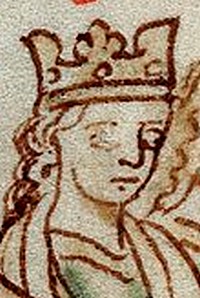Eleanor of Provence
| Eleanor | |
|---|---|
| Queen of England | |
 |
|
| Queen consort of England | |
| Tenure | 14 January 1236 – 16 November 1272 |
| Coronation | 20 January 1236 |
| Born | c. 1223 Aix-en-Provence |
| Died | 24/25 June 1291 Amesbury |
| Burial | Abbey of St Mary and St Melor in Amesbury |
| Spouse | Henry III of England |
| Issue |
Edward I of England Margaret, Queen of Scots Beatrice of England Edmund, Earl of Lancaster Katherine of England |
| House | Barcelona |
| Father | Ramon Berenguer IV, Count of Provence |
| Mother | Beatrice of Savoy |
| Religion | Roman Catholicism |
Eleanor of Provence (c. 1223 – 24/25 June 1291) was Queen consort of England, as the spouse of King Henry III of England, from 1236 until his death in 1272. She served as regent of England during the absence of her spouse in 1253.
Although she was completely devoted to her husband, and staunchly defended him against the rebel Simon de Montfort, 6th Earl of Leicester, she was very much hated by the Londoners. This was because she had brought a large number of relatives with her to England in her retinue; these were known as "the Savoyards", and they were given influential positions in the government and realm. On one occasion, Eleanor's barge was attacked by angry citizens who pelted her with stones, mud, pieces of paving, rotten eggs and vegetables.
Eleanor was the mother of five children, including the future King Edward I of England. She also was renowned for her cleverness, skill at writing poetry, and as a leader of fashion.
Born in Aix-en-Provence, she was the second daughter of Ramon Berenguer IV, Count of Provence (1198–1245) and Beatrice of Savoy (1198–1267), the daughter of Thomas I of Savoy and his second wife Margaret of Geneva. She was well educated as a child, and developed a strong love of reading. Her three sisters also married kings. After her elder sister Margaret married Louis IX of France, their uncle William corresponded with Henry III of England to persuade him to marry Eleanor. Henry sought a dowry of up to twenty thousand silver marks to help offset the dowry he had just paid for his sister Isabella, but Eleanor's father was able to negotiate this down to no dowry, just a promise to leave her ten thousand when he died.
...
Wikipedia
